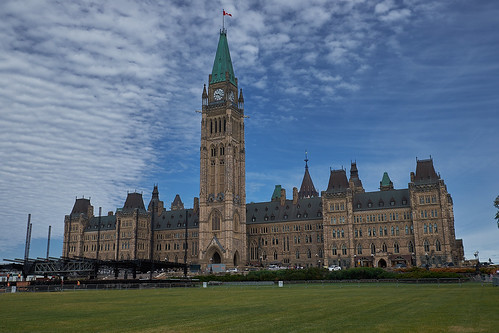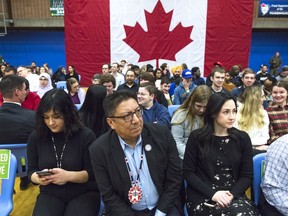First Nations leaders hold emergency meeting in Ottawa on mental health crisis
Ottawa #Ottawa

Breadcrumb Trail Links
Warn the situation could get even worse without government help.
Author of the article:
The Canadian Press
Alessia Passafiume
Published Jan 24, 2024 • 3 minute read
 First Nations leaders held an emergency meeting in Ottawa Wednesday, Jan. 24, 2024 to discuss a mental-health crisis they warn could get even worse without government help. Nishnawbe Aski Nation Grand Chief Alvin Fiddler, centre, looks on during a town hall question-and-answer event with Prime Minister Justin Trudeau, not seen, in Thunder Bay, Ont., Friday, March 22, 2019. Photo by David Jackson /THE CANADIAN PRESS
First Nations leaders held an emergency meeting in Ottawa Wednesday, Jan. 24, 2024 to discuss a mental-health crisis they warn could get even worse without government help. Nishnawbe Aski Nation Grand Chief Alvin Fiddler, centre, looks on during a town hall question-and-answer event with Prime Minister Justin Trudeau, not seen, in Thunder Bay, Ont., Friday, March 22, 2019. Photo by David Jackson /THE CANADIAN PRESS
OTTAWA — First Nations leaders held an emergency meeting in Ottawa on Wednesday to discuss a mental health crisis they warn could get even worse without government help.
Nishnawbe Aski Nation says there has been an alarming spate of suicides and suicide attempts in the northern Ontario First Nations it represents.
Article content
That includes the suicides of a 12-year-old from Sachigo Lake First Nation and a 20-year-old in Deer Lake First Nation earlier this month.
Advertisement 2
This advertisement has not loaded yet, but your article continues below.
THIS CONTENT IS RESERVED FOR SUBSCRIBERS ONLY
There with you then. Here with you now. As a critical part of the community for over 245 years,The Gazette continues to deliver trusted English-language news and coverage on issues that matter. Subscribe now to receive:
SUBSCRIBE TO UNLOCK MORE ARTICLES
There with you then. Here with you now. As a critical part of the community for over 245 years,The Gazette continues to deliver trusted English-language news and coverage on issues that matter. Subscribe now to receive:
REGISTER / SIGN IN TO UNLOCK MORE ARTICLES
There with you then. Here with you now. As a critical part of the community for over 245 years,The Gazette continues to deliver trusted English-language news and coverage on issues that matter. Create an account or sign in to continue with your reading experience.
Article content
And in Kitchenuhmaykoosib Inninuwug First Nation, nine people have died between December and January.
The group is also raising concerns about the recent unexplained deaths of 14-year-old Mackenzie (Nathan) Moonias and 21-year-old Jenna Ostberg in Thunder Bay, and how their deaths are being investigated.
“Our communities are under so much pressure with these multiple tragic events,” the group’s Grand Chief Alvin Fiddler said in an interview.
“And it’s not just human costs — its financial costs that they have to bear. … (Chiefs) are just running on fumes.”
Fiddler said more lives will be needlessly lost without meaningful collective action, adding his organization is aware of the existence of youth suicide pacts in some communities.
“If immediate help doesn’t come, we will lose more young people. We’ll have to attend more funerals and try to comfort grieving families.”
Fiddler asked a list of political leaders to come to the meeting.
Indigenous Services Minister Patty Hajdu attended, along with Crown-Indigenous Relations Minister Gary Anandasangaree, Health Minister Mark Holland and Ya’ara Saks, the minister responsible for mental health and addictions.
Headline News
Thanks for signing up!
Article content
Advertisement 3
This advertisement has not loaded yet, but your article continues below.
Article content
Ontario Premier Doug Ford and provincial ministers were invited but didn’t attend due to scheduling conflicts.
Fiddler said the province’s absence was frustrating.
“Not only is this dealing with the immediate crisis of these tragic losses, but the preventative work that needs to happen so that we don’t lose any more of our children,” he said.
Speaking during the meeting Wednesday, Neskantaga First Nation Chief Chris Moonias said northern First Nations are at a point of collapse with mental health and addiction issues.
Attawapiskat First Nation Chief Sylvia Koostachin-Metatawabin, whose community declared a state of emergency over completed and attempted suicides in 2016, said colonialism and bureaucracy are preventing people from accessing care. Cracks in the health-care system are causing people to die, she said.
Hajdu said the stories she heard from folks in the meeting were devastating, and there’s room for both the federal and provincial governments to do more to support communities.
She noted that besides mental health supports, community members are also highlighting overcrowding and a lack of clean drinking water as prominent issues, adding that they are in the best position to suggest solutions.
Advertisement 4
This advertisement has not loaded yet, but your article continues below.
Article content
“It’s not going to be the government that knows exactly what to do,” said Hajdu.
“First Nations have to be in the driver’s seat of designing whatever intervention it looks like.”
Fiddler said he wants the federal and provincial governments to commit to working with his organization’s youth council so community members can speak directly with politicians about what they’re dealing with, and propose solutions.
On Thursday, Hajdu made the promise that her government will fund a meeting for the youth council in Ottawa so its members can meet with ministers and potentially Prime Minister Justin Trudeau.
Fiddler also said he wants changes to how funding is being administered and delivered in a way that empowers communities to implement solutions of their own.
He pointed to the efforts of Judy Desmoulin, chief of Long Lake #58 First Nation, to fund mental health and substance use treatment centres in her community.
Fiddler said she often tells her community members to do what they need and she’ll try and find funding later as matters are often urgent.
“They have their own initiatives, their own solutions. But there is no funding mechanism to support initiatives like that and others across (Nishnawbe Aski Nation territory),” Fiddler said.
“We’re at the mercy of the federal government and the provincial government.”
And if meaningful change doesn’t happen soon, he said, “We will lose more youth — that’s the bottom line.”
If you or someone you know is thinking about suicide, support is available 24-7 by calling or texting 988, Canada’s national suicide prevention helpline.
Article content
Share this article in your social network